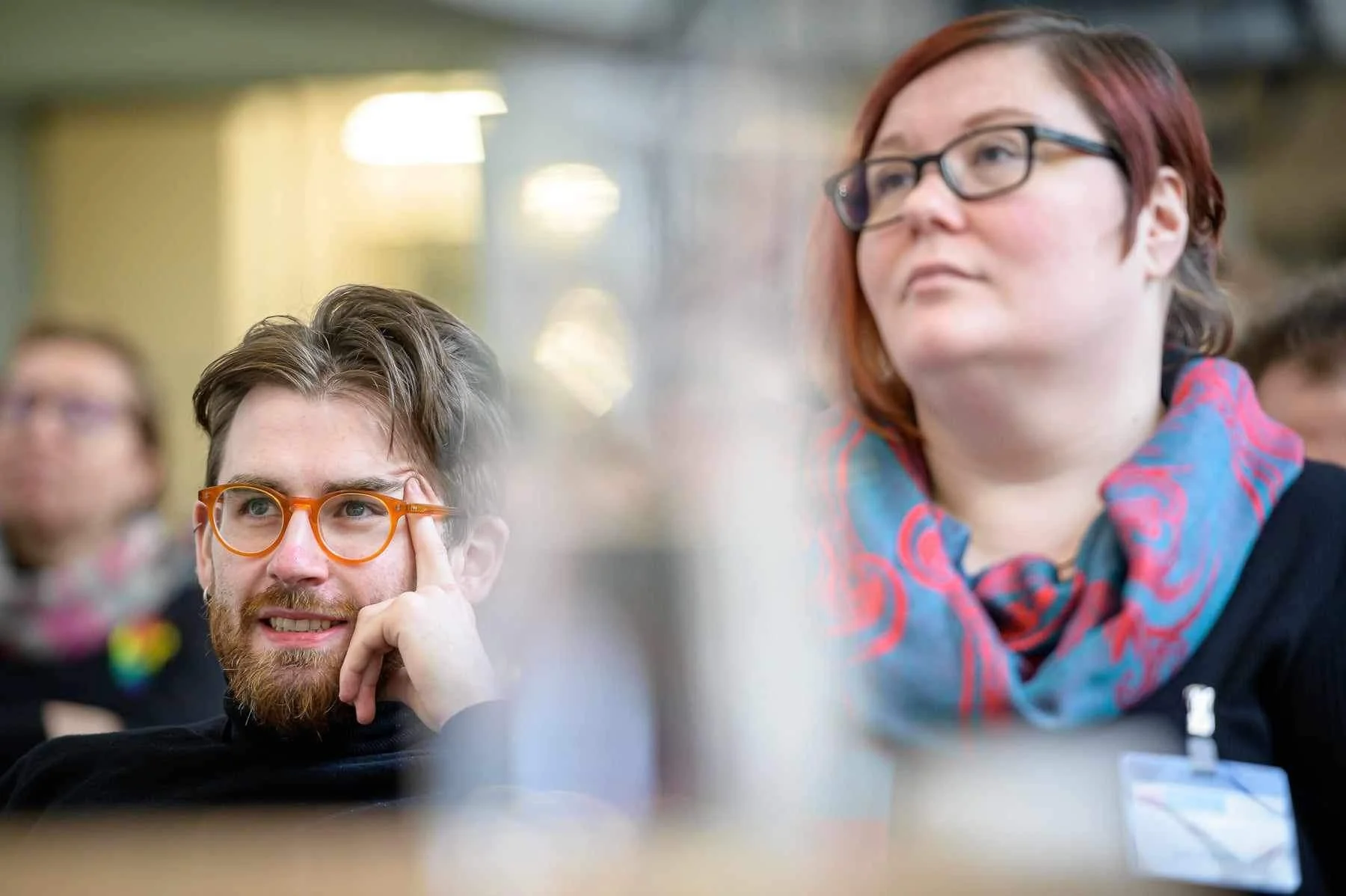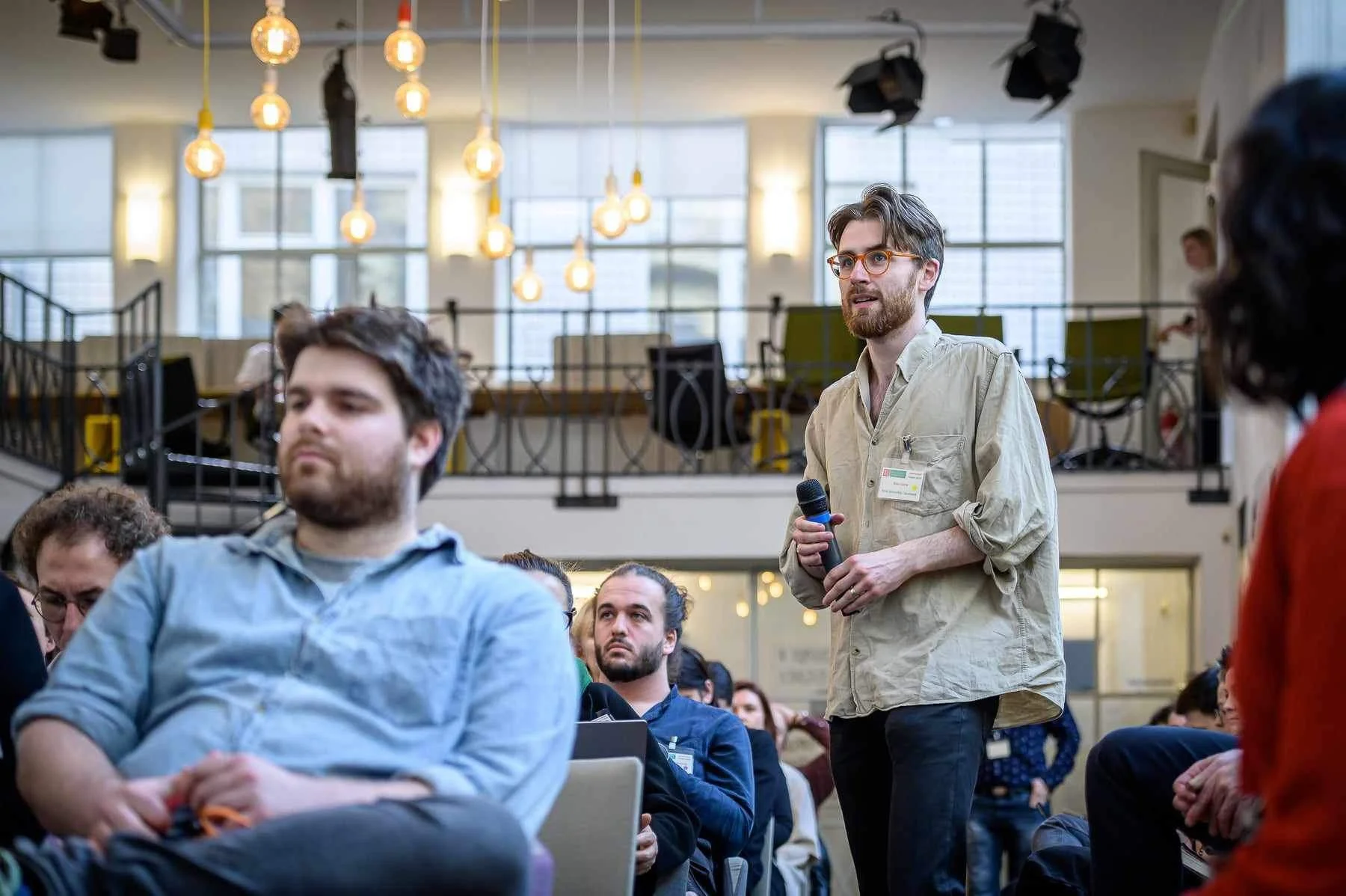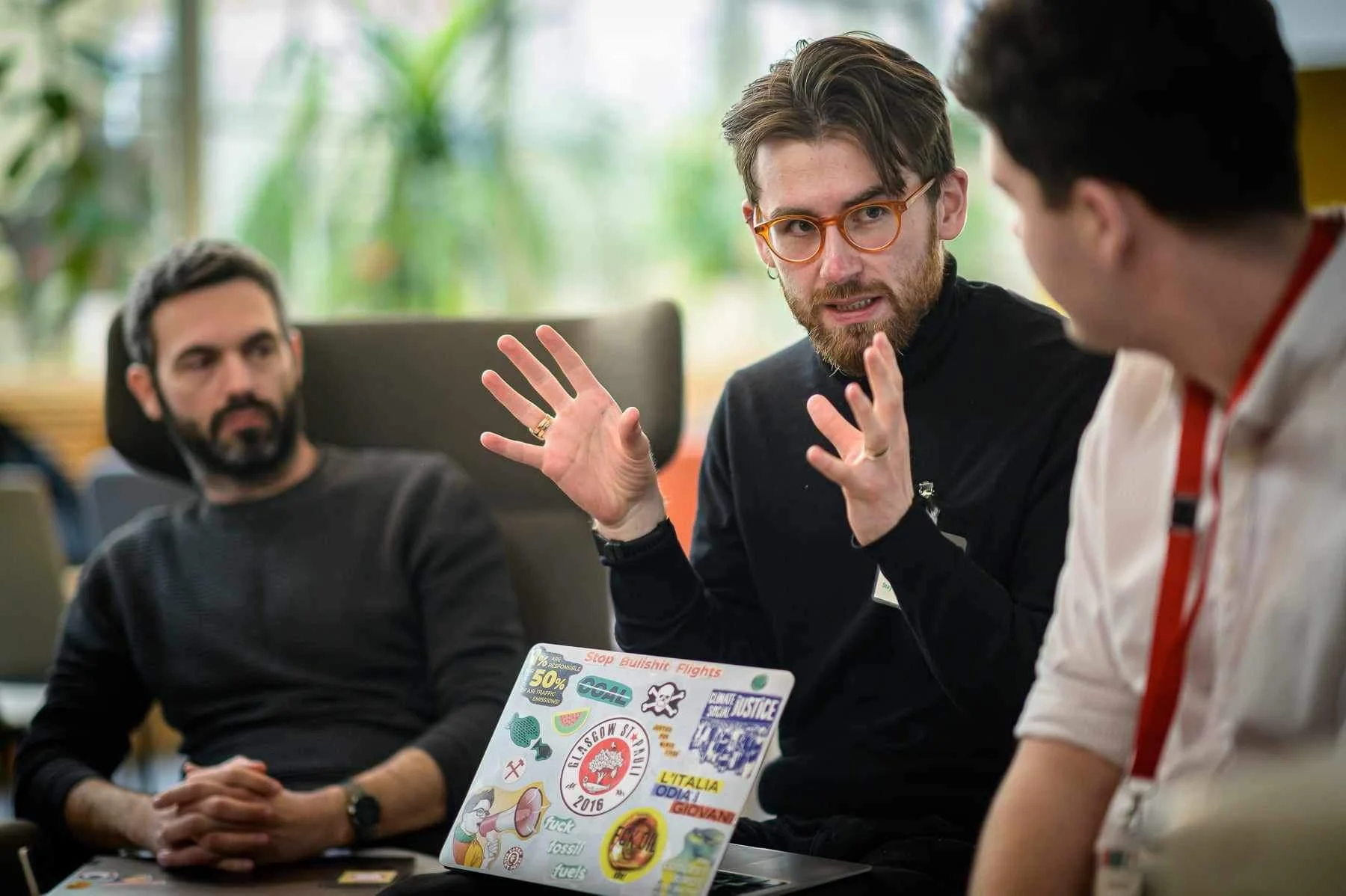The digital organising revolution Europe needs
This blog was originally sent as a newsletter. Subscribe below!
Greetings from Prague—or rather, from a memory of Prague captured in the photo below exactly a month ago. Notice that genuine smile on my face during a presentation? Whether it sprang from the quality of the speaker or my awareness of the camera, let's just say being in politics has its mysteries.
At the moment the photo was taken, I was listening to Ari Dabin-Havt, who helped revolutionise digital organising and donation fundraising as Chief Policy Advisor to Bernie Sanders. I was at the first Bootcamp held by the European Centre for Digital Action (ECDA), the new kids on the block of European campaigning. I mean some of them have been on the block since I was in nursery and Mark Zuckerberg was just a weird college student but “new” in the sense of their collective project, which is “bringing the digital organizing revolution to Europe”, to quote their tagline.
The Bootcamp inspired my last newsletter on why we should reconsider our reliance on social media for political campaigning.
Social media often ensnares us in its orbit, much like a galactic black hole. While it is valuable as a means of two-way conversations with a supporter, and a place to speak to people where they already are, it’s easy to get lost chasing algorithms or the next big trend, forgetting that social media should only serve as a gateway to deeper engagement.
So, how can we effectively move up the ladder of engagement beyond superficial likes and retweets?
The truth-sayers of digital campaigning at ECDA preach the gospel that supporters can offer you three things: their time, their voice, and, yes—their money.
Time can be as simple as handing out flyers or as bold as chasing politicians with a camera (more on that some other time, but we made Rishi Sunak look like a fool at COP26). Voice involves leveraging personal networks, from social media to family gatherings, promoting your cause in more intimate, persuasive settings.
To quote Meg DiMartino, a big boss in the organising of Genocide Joe’s re-election bid this year, speaking in the Washington Post: "you cannot unsubscribe from your mom in the way you can from other organisations." This personal touch is a cornerstone of ‘relational organising’, a method making waves this Presidential election cycle.
Now, Money—it's a tricky subject in Europe, where many feel uneasy about outright asking for donations. Yet, once someone donates, they are likely to do so again. Donations can be emotionally rewarding, providing that instant feel-good sensation, in contrast to the guilt that often comes from failing to participate in more time-intensive actions.
Donating is partly about money, and partly about giving your supporters that warm and fuzzy feeling.
These strategies require robust digital infrastructure. I learned this the hard way during my tenure co-leading the Scottish Young Greens. At our largest online onboarding event well over 100 people showed up, but only a few engaged deeper. A shortfall I attribute to our lack of immediate digital pathways for commitment.
And this is where ECDA comes in - they are experts in this digital infrastructure.
Ádám Ficsor of Estratos (some backbone entity for ECDA that I do not fully understand) puts it aptly,
"Campaigns can make it rain, but you need buckets to collect this rain and turn it into something lasting."
But let’s talk scale and sophistication—here, the U.S. still leads, exemplified by my favorite gossip tidbit: the President of the Young Democrats spent $30,000 to rally support to be elected into his VOLUNTARY position. In Europe, I guess the closest thing to that is me and my partner in crime Benni. We co-lead the Young European Greens, which believe or not does more events, spends more money, employs a bigger office and wields more political power than any other party political youth organisation at the European level (federalist friends, I’m not counting you). To get elected, I ran a campaign. This campaign cost zero euros.
If the US is pouring all this money into developing the most effective ways to campaign, organise and fundraise, then we should learn from them - albeit while adapting it to the European context.
Europe has a GDPR advantage.
American campaigners have a shortcut to building mailing lists; they buy them. Progressive campaigners will literally sell the data of their supporters to other progressives. This is not only ethically fucked up, it also exposes Americans to a deluge of unsolicited emails that often alienate them. This is why Ari Dabin-Havt argues that Americans have ruined it for themselves in a way that Europeans can’t.
In Europe, privacy regulation forces us to do the groundwork to build up our supporter base. God bless the EU.
In Spain, the recent success of green-left party Sumar* in defeating the far-right can partially be explained by the digital strategy they used to engage people, in combination with in-person actions,who then campaigned for and donated to the party.
Turning to civil society, the Hungarian teachers’ movement, Tanítanék*, shows similar success. Starting from a small movement without funding, they built a digital framework that fueled their growth into a mass movement of tens of thousands of people, with teachers striking in defiance of Orban’s outlawing of teachers’ right to strike, raising 600,000 euros in one year, and employing full-time staff. They raised so much money that they are redistributing some of it to other progressive organisations.
Progressives have a community-building advantage
While we navigate an internet increasingly plagued by disinformation and deepfakes—a field where far-right groups excel—we have our enduring strength: community building.
And in the digital world, at the centre of this community building is one clunky piece of technology that was invented 26 years before I was born. Sure, Discord servers offer a new way of community building. Sure, AI allow us to communicate to our audience in new ways and at ever-increasing scales. But ultimately, the best thing an organisation can invest in to engage their supporters is email.
Here, I’ll just finish by quoting Victor Mák, the Co-director of ECDA:
Email is still king… and campaigns that lack a sophisticated email strategy miss out on one of the most reliable avenues for organizing and mobilizing their supporters. Avoiding both the algorithms of social media and the whims and interests of the editorial board at media companies, emails allows you to reach out directly to your supporters. No gatekeepers: it’s just you and them.
It seems to me that the “digital organizing revolution” mentioned in their tagline is really about building resiliency to the waves of digital revolution that are happening all the time.
While the infrastructure we build on our digital landscape needs to be rebuilt every time there is a metaphorical earthquake, like the Muskification of Twitter or the revolution of AI, the essence of our work remains to build communities of people who want to create change.
And the most resilient tool we have is the one you’re using right now. The one that is twice as old as me. It’s email, baby.
Speak soon,
Sean
*These examples & quotes come directly from the first edition of ECDA’s magazine, Digital Progressive. You can sign up for a copy here (it’s free, I think).
STUFF WORTH KNOWING
🤳 Resist call-out culture. By encouraging social media call-outs instead of difficult conversations with our comrades, technology influences how conflicts play out in our organisations. Building on Adrienne Maree Brown’s We Will Not Cancel Us, Claire Haas analyses how the technology of our time is influencing how we organise - for better and for worse.
🇵🇸 Just Stop Oil activists go for Palestinian solidarity. Amid globally accelerating and increasingly successful nonviolent direct action for Palestine, in the UK an offshoot from Just Stop Oil called Youth Demand is using NVDA to push for an end to new oil and gas fields and an arms embargo with Israel. For what it’s worth, I think they’d have more impact focusing entirely on Palestine but big kudos to them regardless.
✈️ Why I campaign against frequent flyer programmes. FFPs are a vulnerable pillar of the aviation industry and a symbol of climate injustice. I wrote a short blog explaining this campaign logic based on a webinar I hosted.
👀 Are the climate backlash and fear of migration overstated? While climate policies such as the nature restoration law are being rolled back to appease discontentment, research on France, Germany and Poland suggests that the ‘climate backlash’ is overstated, with a majority of the population still wanting ambitious climate policy. At the same time, research by ECFR covering 12 of the biggest EU countries shows that the public don’t care about migration as much as most of us think - which is a very good thing.
📚 Solidarity should be at the centre of organising. A new book on social movement strategy by Astra Taylor and Leah Hunt-Hendrix entitled Solidarity argues against elite-centred professionalised campaigning and in favour of solidarity-based organising. This Guardian long read, based on an excerpt from the book, reads like an updated version of Jane McAlevey’s 2016 book No Shortcuts, which is not necessarily a bad thing.


